
Medycyna Weterynaryjna-Veterinary Medicine-Science and Practice
Scope & Guideline
Elevating Standards in Veterinary Medicine Since 1945
Introduction
Aims and Scopes
- Veterinary Clinical Research:
The journal publishes studies that explore clinical practices, diagnostics, and treatments in veterinary medicine, addressing both common and rare conditions in various animal species. - Infectious Diseases and Epidemiology:
A significant focus is placed on the investigation of infectious diseases in animals, including zoonoses and their epidemiological implications, through both field studies and laboratory research. - Pharmacology and Toxicology:
Research on the pharmacological effects of various substances, including antibiotics and alternative therapies, as well as studies on toxicological impacts in animals, is a core area of the journal. - Animal Welfare and Ethics:
The journal emphasizes the importance of animal welfare in veterinary practices and explores ethical considerations in veterinary medicine, including the impact of human-animal relationships. - Nutrition and Feeding Practices:
Studies related to animal nutrition, including feed additives, dietary impacts on health, and nutritional strategies for disease prevention and management, are commonly featured. - Surgical Techniques and Innovations:
The journal highlights advancements in surgical techniques and technologies in veterinary medicine, offering insights into both established and innovative practices. - Veterinary Education and Professional Development:
Research on veterinary education, including teaching methodologies and the professional development of veterinary practitioners, is also a focus area.
Trending and Emerging
- Antimicrobial Stewardship and Resistance:
There is a growing emphasis on the reduction of antibiotic use in veterinary practice, alongside studies addressing antimicrobial resistance, reflecting global health concerns and regulatory changes. - Zoonotic Diseases and Public Health:
Research focusing on zoonotic diseases, their transmission, and public health implications is increasingly prevalent, highlighting the interconnectedness of animal and human health. - Innovative Diagnostic Techniques:
Emerging themes include the use of advanced diagnostic methods, such as molecular techniques and imaging technologies, which are gaining traction as veterinary medicine evolves. - Behavioral Studies and Animal Welfare:
There is an increasing interest in the behavioral aspects of animal health and welfare, with a focus on how stress and environmental factors impact animal well-being. - Alternative Therapies and Integrative Medicine:
The exploration of alternative therapies, including herbal medicine and physiotherapy, is on the rise, as practitioners seek holistic approaches to animal care. - Veterinary Forensics and Legal Aspects:
Emerging interest in veterinary forensics and the legal implications of veterinary practice indicates a growing awareness of the importance of legal knowledge in clinical settings.
Declining or Waning
- Traditional Veterinary Practices:
There appears to be a waning focus on traditional veterinary practices and treatments, as the journal increasingly prioritizes innovative and evidence-based approaches over conventional methods. - Basic Animal Husbandry:
Research centered on basic animal husbandry practices has seen a decline, potentially due to a shift towards more specialized studies that address specific health issues and advanced management strategies. - Veterinary History and Milestones:
While historical perspectives were once more common, recent issues show a decrease in articles focused on historical figures and milestones in veterinary medicine, suggesting a move towards contemporary issues. - General Pet Care Practices:
The topics surrounding routine pet care and general wellness seem to be less frequently addressed, with more emphasis now placed on specific health concerns, diseases, and advanced treatment options.
Similar Journals

Revista Colombiana de Ciencias Pecuarias
Advancing Knowledge in Animal Science and Veterinary StudiesRevista Colombiana de Ciencias Pecuarias, an esteemed publication in the field of Animal Science and Veterinary Studies, is published by the Universidad de Antioquia, Faculty of Agricultural Sciences. Since its inception in 1996, this Open Access journal has become a vital resource for the dissemination of research and advancements within the agricultural and biological sciences, specifically targeting the veterinary and animal husbandry sectors. Situated in Colombia, its mission is to support and promote scientific knowledge through rigorous review processes and high-quality articles. The journal’s recent classification includes Q4 in Animal Science and Zoology and Q3 in Veterinary categories, illustrating its commitment to enhancing its scientific impact. As it converges from 2008 to 2024, this journal aims to engage researchers, professionals, and students alike, establishing a collaborative environment for innovative research and findings that shape the future of animal sciences globally.

Open Veterinary Journal
Bridging Gaps in Veterinary Research for a Healthier WorldOpen Veterinary Journal, published by the University of Tripoli, Faculty of Veterinary Medicine, offers a vital platform for the dissemination of research in the field of veterinary sciences. With an ISSN of 2226-4485 and an E-ISSN of 2218-6050, this journal has been committed to open access since 2011, allowing for unfettered access to its content, which ensures that researchers, practitioners, and students worldwide can benefit from the latest veterinary research findings. Operating from Libya, it has garnered an important position within the academic community, achieving a Q2 quartile ranking in the scope of veterinary (miscellaneous) and maintaining a Scopus rank of 104 out of 194 within the general veterinary category, indicating its growing influence and reach. The journal focuses on a diverse array of topics pertinent to contemporary veterinary practice, aiming to bridge gaps in knowledge and foster collaboration among scholars and practitioners. As it continues to publish original research and reviews, Open Veterinary Journal stands as a crucial resource for advancing veterinary medicine, supporting innovative research, and enhancing educational outcomes within the profession.
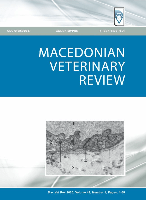
Macedonian Veterinary Review
Enhancing animal welfare through shared knowledge.Macedonian Veterinary Review is a prominent open access journal dedicated to advancing the field of veterinary science. Published by SCIENDO, this journal provides a crucial platform for researchers, professionals, and students to share their findings and insights related to veterinary practices, animal health, and welfare. Established with the aim of fostering knowledge exchange since its inception in 2010, the journal has made significant strides, evidenced by its 2023 Scopus ranking of #131 out of 194 in the General Veterinary category, placing it in the 32nd percentile among its peers. The journal's open access model enhances the dissemination of knowledge, ensuring that vital research reaches a wider audience, thereby addressing key issues in the veterinary landscape. With its base in Macedonia and a commitment to high-quality scholarly contributions, the Macedonian Veterinary Review is an essential resource for anyone involved in veterinary research and practice, reflecting the ongoing developments and challenges in this critical field.
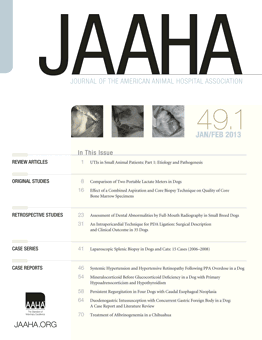
JOURNAL OF THE AMERICAN ANIMAL HOSPITAL ASSOCIATION
Connecting research and practice for the betterment of animal welfare.JOURNAL OF THE AMERICAN ANIMAL HOSPITAL ASSOCIATION (ISSN: 0587-2871, E-ISSN: 1547-3317), published by the American Animal Hospital Association, is a premier resource for veterinary professionals, researchers, and students focusing on the field of veterinary medicine. Established in 1973, this esteemed journal serves as a vital platform for disseminating cutting-edge research and clinical insights in the management and care of small animals, boasting a remarkable Q1 ranking in Small Animals and a Q2 ranking in Medicine (miscellaneous), reflecting its high impact in the field. With a Scopus rank of #6 in the veterinary small animals category and a 72nd percentile standing, it offers valuable content covering a diverse range of topics pertinent to animal health and welfare. Although not open access, the journal provides essential resources that contribute significantly to the ongoing professional development of veterinary practitioners and the broader scientific community, thus solidifying its status as a cornerstone of veterinary literature.
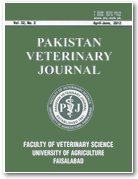
PAKISTAN VETERINARY JOURNAL
Fostering collaboration for a sustainable veterinary community.Pakistan Veterinary Journal (ISSN: 0253-8318, E-ISSN: 2074-7764) is a leading peer-reviewed academic journal published by the University of Agriculture, Faculty of Veterinary Science, situated in Faisalabad, Pakistan. Since its inception, the journal has embraced an Open Access policy, facilitating the dissemination of vital research findings to a global audience and enhancing the visibility of veterinary science. With an impressive Q1 ranking in the veterinary miscellaneous category, the journal ranks #27 out of 194 in the veterinary general field according to Scopus, placing it in the top 14% of the discipline. The scope of the journal encompasses a wide array of topics relevant to veterinary medicine, ensuring that it serves as an essential resource for researchers, professionals, and students alike. By providing a platform for high-quality research from 2009 to 2024, the Pakistan Veterinary Journal continues to play a pivotal role in advancing veterinary science, promoting collaboration among scholars, and addressing contemporary challenges in animal health and welfare.

MAGYAR ALLATORVOSOK LAPJA
Fostering Discovery in Veterinary MedicineMAGYAR ALLATORVOSOK LAPJA is a prominent journal dedicated to the field of veterinary science, published by MEZOGAZDA KIADO KFT in Hungary. With its inaugural issue dating back to 1950 and a continued presence into 2024, this journal serves as a vital platform for disseminating research and advancements in veterinary medicine and related areas. While the journal currently holds a Q4 classification in the Veterinary (miscellaneous) category, it provides a critical outlet for emerging findings and perspectives that may not be covered in more mainstream publications. Researchers, professionals, and students engaged in the veterinary field will benefit from its diverse range of articles, which are crucial for fostering knowledge and innovation in veterinary practice. Though it does not offer an open access option, the journal remains an essential resource for those looking to deepen their understanding of the veterinary landscape. The commitment to advancing the field is evident in every publication, making MAGYAR ALLATORVOSOK LAPJA a noteworthy contribution to veterinary literature.

Thai Journal of Veterinary Medicine
Advancing veterinary science for a healthier tomorrow.Thai Journal of Veterinary Medicine, published by Chulalongkorn University, serves as a vital resource for researchers, practitioners, and students in the field of veterinary science. With an ISSN of 0125-6491, the journal has been providing a platform for the dissemination of original research and reviews since its inception, with a focus on advancing veterinary practice and animal health in Thailand and the broader Southeast Asian region. The journal is recognized in the Scopus database, currently ranked in the Q4 category for Veterinary (miscellaneous), reflecting its commitment to quality despite being in a highly competitive space. The scope of the journal encompasses a wide array of topics pertinent to veterinary medicine, ensuring accessibility to diverse veterinary disciplines. While the journal currently does not offer an open-access option, it remains dedicated to contributing valuable knowledge and insights to the veterinary community, supporting the improvement of animal welfare and public health initiatives in the region. As it continues to publish until 2024, the Thai Journal of Veterinary Medicine invites contributions that align with its objectives of fostering scholarly discourse and advancing veterinary research.
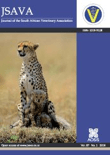
Journal of the South African Veterinary Association
Unlocking Knowledge for Veterinary Professionals WorldwideJournal of the South African Veterinary Association is a prominent Open Access journal dedicated to advancing the field of veterinary science since its inception in 1945. Published by MEDPHARM PUBLICATIONS PTY LTD, this journal stands out with an impactful HIndex and a commendable categorization in 2023, ranking Q3 in Medicine (miscellaneous) and Q2 in Veterinary (miscellaneous). With a Scopus rank of 96 out of 194 in the veterinary field, it serves as an essential resource for researchers, veterinary professionals, and students, promoting the dissemination of high-quality research and knowledge. The journal offers a platform for peer-reviewed articles covering diverse topics relevant to veterinary and animal health issues, encouraging expansive dialogue and collaboration within the academic community. Based in Centurion, South Africa, and accessible globally since it adopted an Open Access model in 1997, the journal exemplifies a commitment to accessibility and the sharing of knowledge.

Kleintierpraxis
Elevating standards in small animal veterinary science.Kleintierpraxis is a prominent journal dedicated to the field of small animal veterinary science, published by M H SCHAPER GMBH CO KG in Germany. With an ISSN of 0023-2076, the journal aims to disseminate cutting-edge research, clinical findings, and advancements in veterinary practices affecting small animals. Although it is categorized within the Q4 quartile for Small Animals in 2023 and holds a Scopus rank of 20 out of 20, its role in providing valuable insights to practitioners, researchers, and students in veterinary medicine cannot be underestimated. The journal covers a wide range of topics pertinent to veterinary care, diagnostics, and treatment methodologies, offering an essential resource for understanding the complexities of small animal health. While currently not open access, Kleintierpraxis continues to be a vital contribution to the veterinary literature landscape from 1996 through 2024, fostering professional development and knowledge within the community.
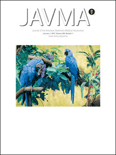
JAVMA-JOURNAL OF THE AMERICAN VETERINARY MEDICAL ASSOCIATION
Empowering veterinarians with cutting-edge studies.JAVMA - Journal of the American Veterinary Medical Association, a leading publication in the field of veterinary medicine, has been a cornerstone of veterinary research and practice since its inception in 1945. Published by the American Veterinary Medical Association, this esteemed journal provides a vital platform for disseminating innovative studies, clinical findings, and advancements that enhance the welfare of animals and the practice of veterinary medicine. With an impressive impact factor reflecting its scholarly influence and a position in the top quartile (Q2) among veterinary journals, JAVMA is recognized for its rigorous peer-review process and high-quality content. Although the journal does not offer Open Access, it remains accessible through a variety of academic libraries and institutions, making it a crucial resource for researchers, veterinarians, and students dedicated to advancing the field. With a Scopus rank of #92 out of 194 in the general veterinary category, JAVMA is committed to fostering knowledge and discussions that shape the future of veterinary science.